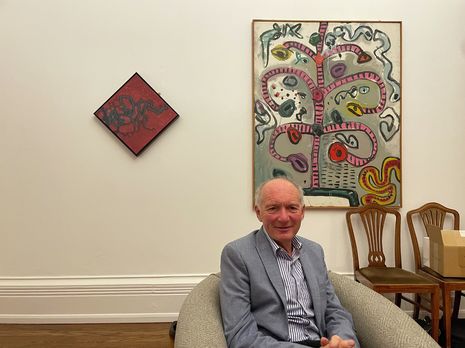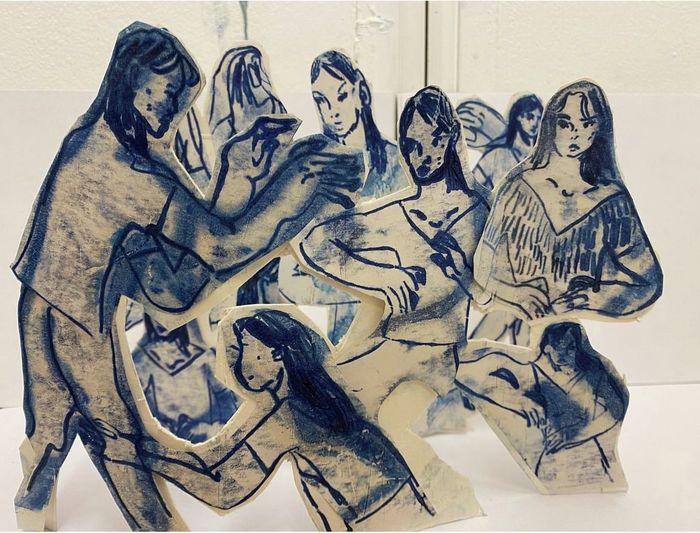Downing master Alan Bookbinder on working in the ‘Golden Age’ of Television
Bookbinder discusses his TV career, from filming in the Soviet Union to covering 9/11

In 1981, martial law was imposed in Poland. Tanks rolled out into the streets, phones were tapped, and democracy was lost. Filming in Poland for BBC Panorama at the time, future Downing Master Alan Bookbinder found himself in the hot seat. Worried his footage would be discovered and “confiscated,” his team packed their bags that very night. A rapid exit from Poland was followed by an all-night edit and a breaking news programme that aired the next Monday.
Most of us know Mr Bookbinder as we find him in Downing College’s Master’s Lodge. Hosting drinks and concerts, reciting the Latin no one listens to at formals, and sometimes throwing on a Hogwarts-esque wizard’s hat, Bookbinder is willing to poke fun at the strange, mythological image of the Oxbridge Master. The students affectionately call him ‘Bookie’. Few of us know him as the highly-charged BBC documentarian who braved Cold War Poland.
Few of us know him as the BBC documentary-maker who braved Cold War Poland
Whilst most modern languages students spend their year abroad sweltering in the South American sun or living out their Midnight in Paris fantasies, in the late seventies Bookbinder found himself in the Soviet Union. He is quick to batter down my surprise to this atypical year abroad. Yes, there will have been “students told to report on” him and the other foreigners - and their telephone calls home will have been listened into (of course) - but no, he didn’t feel unsafe or under threat. Everyday life largely went on, he insists.
What is most arresting about Alan is this stout resistance to the theatrical or the sensationalised. Clickbait culture is held at arm’s length. Thatcher and Reagan’s image of Soviet Russia as an ‘evil empire’ is held with suspicion. The job of a journalist, he says, is not to paint obvious, hyperbolic pictures of Gorbachev and Putin but to convey “something of the texture of everyday life”.
TV that nourished us has been replaced by a fast-food equivalent
Returning to Russia in 1985, almost a decade after his year abroad, Bookbinder worked on a TV Series called Comrades. At a time when western media was largely pushing a fearful image of the Soviet Union, Comrades offered ordinary filmic profiles of everyday Russians and their lives. “A teacher in Moscow, a fur trapper in Siberia, a soccer coach in Azerbaijan, a judge in Moldova”. What was it like to go shopping in Russia, to be at primary school or work in a factory there? This was the subject matter that appealed to Bookbinder.
The next stop in his professional journey was heading the BBC’s Religion and Ethics department. He took the role, and six weeks later 9/11 happened. What was once a “backwater” branch of the BBC’s network was pushed into the spotlight. Again, Alan’s approach was to resist theatrical images that fetishised America’s national tragedy. His priority was sensitively quelling the mania around “the mutation that was Jihadism,” and instead informing and educating people about ordinary Muslims and their lives (which bear no relationship with the events of September 11th). Questioning and undermining grand narratives seems to be a key theme.
Bookbinder argues that around thirty years ago there was something of a TV “golden age”. Each week, the BBC aired science, history, arts, and religion programmes. Those documentaries nourished, but they have been replaced by a lazy and predictable “fast-food” equivalent. He left the BBC because he began to worry that he had become the nostalgic and bitter “old git,” collecting dust in the corner and harking back to the old days. So, he found himself a stereotypical old-git job - the Oxbridge Master-ship.
I don’t agree that documentaries are doomed. The recent film For Sama does exactly what Alan would want it to do. It gives the audience access into the Syrian war through the lens of two parents who are trying to make life as normal as possible for their daughter. It beautifully treads the line between portraying war’s horror without sensationalising it.
But I also don’t think that this makes Bookbinder an “old git”. From a young perspective, his concerns about filmmaking are wonderfully relevant. In his case, the anachronistic image of the Oxbridge Master only disguises his radical open-mindedness, generosity and self-effacing willingness to disappear behind a story. For him, filmmaking is about “facilitating” other people and their narratives.
Bookbinder leaves Cambridge at the end of this academic year, and will be replaced by Downing alumnus Graham Virgo. He says leaving will be a “real wrench.” I can’t help but think it’ll be a bigger wrench for the students.
 News / Eight Cambridge researchers awarded €17m in ERC research grants27 December 2025
News / Eight Cambridge researchers awarded €17m in ERC research grants27 December 2025 News / Clare Hall spent over £500k opposing busway 24 December 2025
News / Clare Hall spent over £500k opposing busway 24 December 2025 Comment / League tables do more harm than good26 December 2025
Comment / League tables do more harm than good26 December 2025 Comment / The ‘class’ of Cambridge24 December 2025
Comment / The ‘class’ of Cambridge24 December 2025 News / Caius mourns its tree-mendous loss23 December 2025
News / Caius mourns its tree-mendous loss23 December 2025










